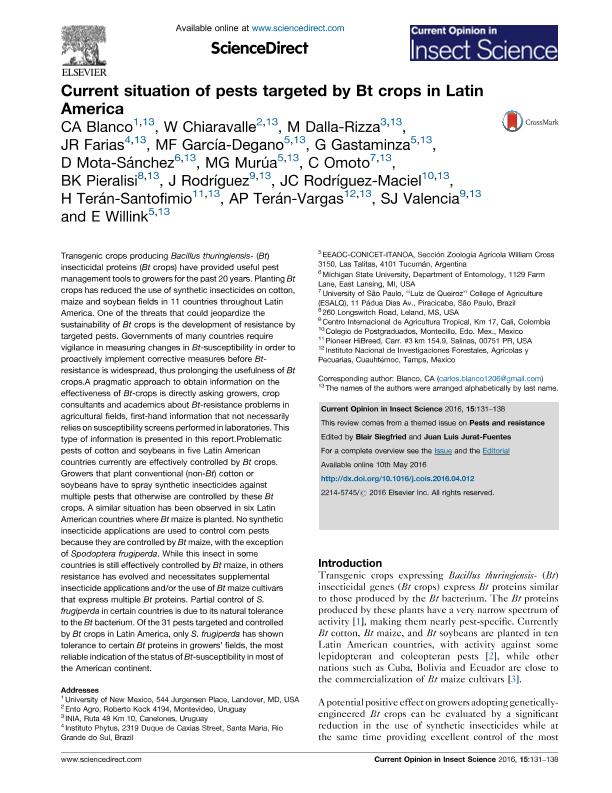Artículo
Current situation of pests targeted by Bt crops in Latin America
Blanco, C.A.; Chiaravalle, W.; Dalla Rizza, M.; Farias, J. R.; García Degano, M. F.; Gastaminza, Gerardo Alfredo; Mota Sánchez, D.; Murúa, María Gabriela ; Omoto, C.; Pieralisi, B. K.; Rodríguez, J.; Rodríguez Maciel, J. C.; Terán Santofimio, H.; Terán Vargas, A.P.; Valencia, S. J.; Willink, Eduardo
; Omoto, C.; Pieralisi, B. K.; Rodríguez, J.; Rodríguez Maciel, J. C.; Terán Santofimio, H.; Terán Vargas, A.P.; Valencia, S. J.; Willink, Eduardo
 ; Omoto, C.; Pieralisi, B. K.; Rodríguez, J.; Rodríguez Maciel, J. C.; Terán Santofimio, H.; Terán Vargas, A.P.; Valencia, S. J.; Willink, Eduardo
; Omoto, C.; Pieralisi, B. K.; Rodríguez, J.; Rodríguez Maciel, J. C.; Terán Santofimio, H.; Terán Vargas, A.P.; Valencia, S. J.; Willink, Eduardo
Fecha de publicación:
06/2016
Editorial:
Elsevier Inc
Revista:
Current Opinion in Insect Science
ISSN:
2214-5745
Idioma:
Inglés
Tipo de recurso:
Artículo publicado
Clasificación temática:
Resumen
Transgenic crops producing Bacillus thuringiensis- (Bt) insecticidal proteins (Bt crops) have provided useful pest management tools to growers for the past 20 years. Planting Bt crops has reduced the use of synthetic insecticides on cotton, maize and soybean fields in 11 countries throughout Latin America. One of the threats that could jeopardize the sustainability of Bt crops is the development of resistance by targeted pests. Governments of many countries require vigilance in measuring changes in Bt-susceptibility in order to proactively implement corrective measures before Bt-resistance is widespread, thus prolonging the usefulness of Bt crops. A pragmatic approach to obtain information on the effectiveness of Bt-crops is directly asking growers, crop consultants and academics about Bt-resistance problems in agricultural fields, first-hand information that not necessarily relies on susceptibility screens performed in laboratories. This type of information is presented in this report. Problematic pests of cotton and soybeans in five Latin American countries currently are effectively controlled by Bt crops. Growers that plant conventional (non-Bt) cotton or soybeans have to spray synthetic insecticides against multiple pests that otherwise are controlled by these Bt crops. A similar situation has been observed in six Latin American countries where Bt maize is planted. No synthetic insecticide applications are used to control corn pests because they are controlled by Bt maize, with the exception of Spodoptera frugiperda. While this insect in some countries is still effectively controlled by Bt maize, in others resistance has evolved and necessitates supplemental insecticide applications and/or the use of Bt maize cultivars that express multiple Bt proteins. Partial control of S. frugiperda in certain countries is due to its natural tolerance to the Bt bacterium. Of the 31 pests targeted and controlled by Bt crops in Latin America, only S. frugiperda has shown tolerance to certain Bt proteins in growers' fields, the most reliable indication of the status of Bt-susceptibility in most of the American continent.
Palabras clave:
Bt Crops
,
Insects Resistance Management
,
Latin America
,
Pests
Archivos asociados
Licencia
Identificadores
Colecciones
Articulos(ITA-NOA)
Articulos de INST. DE TECNOLOG. AGROINDUST. DEL NOROESTE ARGENTINO
Articulos de INST. DE TECNOLOG. AGROINDUST. DEL NOROESTE ARGENTINO
Citación
Blanco, C.A.; Chiaravalle, W.; Dalla Rizza, M.; Farias, J. R.; García Degano, M. F.; et al.; Current situation of pests targeted by Bt crops in Latin America; Elsevier Inc; Current Opinion in Insect Science; 15; 6-2016; 131-138
Compartir
Altmétricas



